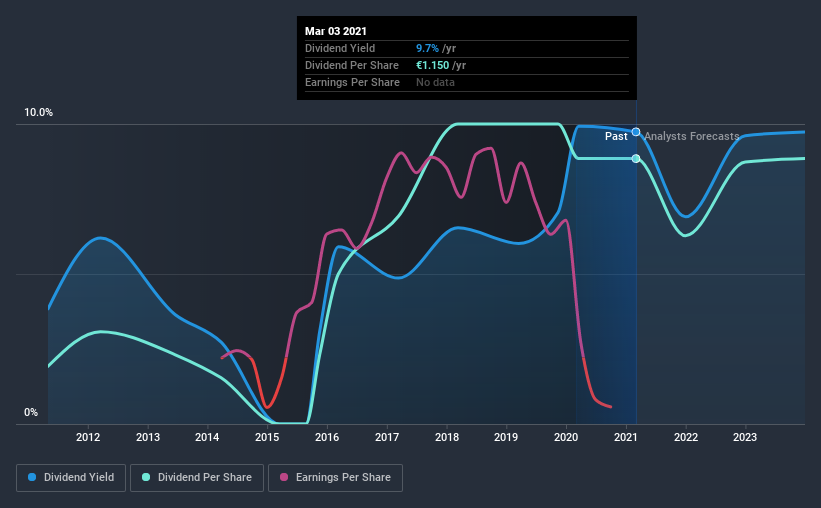- Greece
- /
- Oil and Gas
- /
- ATSE:MOH
Know This Before Buying Motor Oil (Hellas) Corinth Refineries S.A. (ATH:MOH) For Its Dividend
Is Motor Oil (Hellas) Corinth Refineries S.A. (ATH:MOH) a good dividend stock? How can we tell? Dividend paying companies with growing earnings can be highly rewarding in the long term. Yet sometimes, investors buy a stock for its dividend and lose money because the share price falls by more than they earned in dividend payments.
With Motor Oil (Hellas) Corinth Refineries yielding 9.7% and having paid a dividend for over 10 years, many investors likely find the company quite interesting. We'd guess that plenty of investors have purchased it for the income. When buying stocks for their dividends, you should always run through the checks below, to see if the dividend looks sustainable.
Explore this interactive chart for our latest analysis on Motor Oil (Hellas) Corinth Refineries!

Payout ratios
Dividends are usually paid out of company earnings. If a company is paying more than it earns, then the dividend might become unsustainable - hardly an ideal situation. As a result, we should always investigate whether a company can afford its dividend, measured as a percentage of a company's net income after tax. Although it reported a loss over the past 12 months, Motor Oil (Hellas) Corinth Refineries currently pays a dividend. When a company recently reported a loss, we should investigate if its cash flows covered the dividend.
Last year, Motor Oil (Hellas) Corinth Refineries paid a dividend while reporting negative free cash flow. While there may be an explanation, we think this behaviour is generally not sustainable.
Consider getting our latest analysis on Motor Oil (Hellas) Corinth Refineries' financial position here.
Dividend Volatility
Before buying a stock for its income, we want to see if the dividends have been stable in the past, and if the company has a track record of maintaining its dividend. For the purpose of this article, we only scrutinise the last decade of Motor Oil (Hellas) Corinth Refineries' dividend payments. Its dividend payments have declined on at least one occasion over the past 10 years. During the past 10-year period, the first annual payment was €0.3 in 2011, compared to €1.2 last year. This works out to be a compound annual growth rate (CAGR) of approximately 16% a year over that time. The dividends haven't grown at precisely 16% every year, but this is a useful way to average out the historical rate of growth.
It's not great to see that the payment has been cut in the past. We're generally more wary of companies that have cut their dividend before, as they tend to perform worse in an economic downturn.
Dividend Growth Potential
With a relatively unstable dividend, it's even more important to see if earnings per share (EPS) are growing. Why take the risk of a dividend getting cut, unless there's a good chance of bigger dividends in future? Motor Oil (Hellas) Corinth Refineries' EPS have fallen by approximately 13% per year during the past five years. A sharp decline in earnings per share is not great from from a dividend perspective, as even conservative payout ratios can come under pressure if earnings fall far enough.
Conclusion
When we look at a dividend stock, we need to form a judgement on whether the dividend will grow, if the company is able to maintain it in a wide range of economic circumstances, and if the dividend payout is sustainable. Motor Oil (Hellas) Corinth Refineries' dividend is not well covered by free cash flow, plus it paid a dividend while being unprofitable. Second, earnings per share have been in decline, and its dividend has been cut at least once in the past. Using these criteria, Motor Oil (Hellas) Corinth Refineries looks quite suboptimal from a dividend investment perspective.
Companies possessing a stable dividend policy will likely enjoy greater investor interest than those suffering from a more inconsistent approach. Still, investors need to consider a host of other factors, apart from dividend payments, when analysing a company. To that end, Motor Oil (Hellas) Corinth Refineries has 2 warning signs (and 1 which is a bit unpleasant) we think you should know about.
If you are a dividend investor, you might also want to look at our curated list of dividend stocks yielding above 3%.
When trading Motor Oil (Hellas) Corinth Refineries or any other investment, use the platform considered by many to be the Professional's Gateway to the Worlds Market, Interactive Brokers. You get the lowest-cost* trading on stocks, options, futures, forex, bonds and funds worldwide from a single integrated account. Promoted
New: Manage All Your Stock Portfolios in One Place
We've created the ultimate portfolio companion for stock investors, and it's free.
• Connect an unlimited number of Portfolios and see your total in one currency
• Be alerted to new Warning Signs or Risks via email or mobile
• Track the Fair Value of your stocks
This article by Simply Wall St is general in nature. It does not constitute a recommendation to buy or sell any stock, and does not take account of your objectives, or your financial situation. We aim to bring you long-term focused analysis driven by fundamental data. Note that our analysis may not factor in the latest price-sensitive company announcements or qualitative material. Simply Wall St has no position in any stocks mentioned.
*Interactive Brokers Rated Lowest Cost Broker by StockBrokers.com Annual Online Review 2020
Have feedback on this article? Concerned about the content? Get in touch with us directly. Alternatively, email editorial-team (at) simplywallst.com.
About ATSE:MOH
Motor Oil (Hellas) Corinth Refineries
Motor Oil (Hellas) Corinth Refineries S.A.
Slight risk with mediocre balance sheet.
Market Insights
Community Narratives





